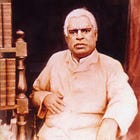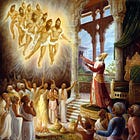Is varnāśrama essential for practicing devotional service?
Does Bhakti include a culture that we need to adopt in order to be able to serve Krsna? Can I just keep my own culture, continuing to dress in the same way, eat the same type of food, and so on?
Does Bhakti include a culture that we need to adopt in order to be able to serve Krsna? Can I just keep my own culture, continuing to dress in the same way, eat the same type of food, and so on, and at the same time worship Krsna?
It's possible to put forward arguments on both sides. Yes, bhakti includes a form of culture, in the form of the classic Vedic culture and the system of varnāśrama, which is favorable for the cultivation of love for Krsna, but at the same time, bhakti can be practiced by people in all ways of life, regardless of which type of culture they identify with. Both ideas are simultaneously acceptable, and we can see that Prabhupada emphasizes one or the other side while talking to different people in different circumstances. Just following rules and regulations is not as important as understanding the essence of them.
In Teachings of Lord Caitanya, it's described that when Lord Caitanya asked Ramananda Raya about the ultimate goal of human life, Ramananda answered that “A person who is sincere in performing his occupational duty will gradually develop a sense of God consciousness”, emphasizing the usefulness of the system of varnāśrama (and the Vedic culture that it includes) as a platform favorable for the practice of bhakti.
Srila Prabhupada explains this passage by emphasizing the idea of dovetailing our activities with Krsna. This is a point that is very well explained in the Bhagavad-Gita. We often think that varnāśrama is just a set of rules, but this is just the external part of it. The essence of the varnāśrama system is to teach people to perform their activities as an offering to Krsna, and thus gradually awaken their Krsna Consciousness. He emphasizes that "regulated life is the source of perfection for everyone. One who leads a regulated life centered around devotional service to the Lord attains perfection."
At the same time, however, Srila Prabhupada mentions that just following rules and regulations as a cultural or religious practice, without developing Krsna Consciousness, is just a waste of time. We can see that that's precisely the mistake we commit when we promote varnāśrama as just a set of rules, instead of emphasizing the essence of the system, which is learning to perform our activities as a service to Krsna.
Of course, the conversation of Lord Caitanya with Ramananda Raya was supposed to go much higher than a simple talk about rules and regulations, or even a discussion about Karma-yoga, and therefore Lord Caitanya rejected this offer as "external" and requested Ramananda Raya to go deeper into the topic, all the way up to the pure love of the gopis to Krsna, with which he was finally satisfied. This doesn't mean, however, that talks about varnāśrama and karma-yoga are not important. The first step of a stair is as important as the last since without going through it, we can't reach the top.
Another mistake is to confuse varnāśrama with Hinduism. Varnāśrama is the pure system described in the Vedas, which is not currently practiced on a large scale anywhere in the world, while Hinduism is the current cultural identity of the Indian people. Hinduism is much closer to Vedic culture than most other cultures in the world, but it is important to understand that it is not equivalent. Indian people still need to understand and change to meet the Vedic standards and be careful not to change the system, mixing it with their cultural background, just like people from other places in the world. As Srila Prabhupada mentions in the introduction of Sri Upanisad: "You may call the Vedas Hindu, but “Hindu” is a foreign name. We are not Hindus. Our real identification is varṇāśrama. Varṇāśrama denotes the followers of the Vedas".
In this way, there is a cultural system that is conducive to the practice of the process of bhakti, and this system can be divided into two parts. The first part is an external set of rules and regulations to regulate human behavior and prevent people from doing things that will harm their spiritual progress (such as different immoral acts), as well as to cultivate habits that are conducive to their spiritual practice, and the second part is the essential consciousness of dovetailing our activities with the service to the Lord.
The first part, the external set of rules, may be adapted to different cultures. We know that in Vedic culture women used saris, for example, but saris may be replaced by some other type of chaste clothing, as long as the principle of covering one's body and dressing in a way that may be pleasing to Krsna is maintained. Similarly, people in Vedic culture were eating preparations such as rice, dhal, different types of boiled and fried vegetables, milk sweets, and so on. The preparations may change according to the place and available ingredients, but the essence of cooking pure food and offering it to Krsna before honoring it as prasāda must be maintained.
In other words, it's important to follow the principles of the Vaishnava culture as part of our process of Bhakti, since without it, we may be stuck in the sinful platform and thus not be able to reach the ultimate goal of love for Krsna (women dressing in mini-skirts and men drinking beer may not be very favorable). On the other hand, it is also essential to understand the essence of the varnāśrama culture and find practical ways to apply it to our reality, instead of trying to reduce the system to a stereotyped set of rules.
One of the greatest mistakes we make when we try to broadcast Krsna Consciousness is to impose our personal stereotyped beliefs or preferences into the bhakti process and start to insist that others should also accept them in the same dogmatic way as we do. This causes much of the quarreling and division we see among different Vaishnava groups.
That's just yet another example of the tridimensionality of spiritual topics, in opposition to the duality of material considerations. Under the lower modes of nature, we tend to see duality, black and white, hot and cold, and so on. Our understanding of different topics becomes thus flat, like a chapati, and we become incapable of considering more than two sides. This mentality, however, doesn't work very well with spiritual topics, which are tridimensional in nature, with different possible points of view which are ultimately harmonized into a higher understanding. When our consciousness is limited to the material platform, we fail to understand all these delicate points and tend to just polarize and quarrel over the two sides of the chapati.
Srila Bhaktivinoda Thākura explains in his Jaiva Dharma that all forms of culture are reflections of distortions of the varnāśrama system. All kinds of organized societies contain certain aspects of the varnāśrama system since no society can function without at least some vestiges of it. In all societies, there are intellectuals and religionists, politicians and military men, farmers and businessmen, and different types of workers. This natural division is found everywhere, all the way from aboriginal tribes to modern capitalist and communist countries. The point is that these different societies are organized in a more or less accidental way, without any systematic system of training and understanding of the ultimate goal, and are thus plagued with all kinds of faults. Varnāśrama means precisely to offer such training, so people can understand what is the goal of life and walk towards this goal.
If you read this article to the end, give it a like. This makes Substack recommend it to more people.
Read also:






Hare Krishna, Prabhu.
So beautifully explained.
I have a question, Prabhu.
When other cultures (religions) with their practices based on their custom, beliefs and commandment from their messengers (includes so called Hinduism and various sampradayas) leave no room and declare for extermination of our beliefs ( teachings of Bhagavad Gita), how do we face them?.
Hare Krishna Prabhu ji. Very well written article to understand the balance between varnashrama system and Bhakti. Prabhu one question, as Srila Prabhupada mentioned that his 50 percent work to establish varnashrama dharma is pending and my disciples should do that and many of his Disciples are working on it . But I just wanted to know that I have seen many devotees saying that Varnashrama is not possible in today's era and it is not valuable to to put efforts in the direction of Varnashrama, why is it so? Like i have seen HH Bhakti Raghava Swami Maharaj and many other sannyasis they are trying hard to bring back Varnashrama by establishing gurukuls and Varnashrama colleges.